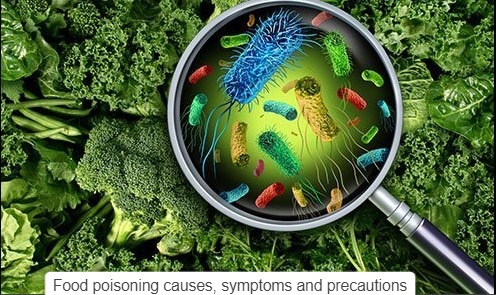Food poisoning causes, symptoms and precautions
Food poisoning is an illness caused by food. Contaminated food and ingestion of infectious organisms, including bacteria, viruses and parasites, or their toxins, are the most common causes of food poisoning.
 |
| Food poisoning causes, symptoms and precautions |
Symptoms of Food Poisoning
The main symptoms of the food poisoning can range from mild to very severe(very high). It depends on how serious or dangerous the germs you swallowed are. Most common symptoms of food poisoning are following these are the common one:
The severe abdominal pain,Upset stomach with pain,nausea,vomiting,fever and diarrhea
After consuming unsafe (contaminated) food or drink, symptoms may take hours or days to develop. If you have symptoms of food poisoning, such as diarrhea or vomiting, drink plenty of fluids (water, fresh juices, vegetables, etc.) to prevent dehydration so that you don't lose enough water present in the body.
Causes of food poisoning
Some foods are more likely to cause food borne illness and food poisoning than others. They can carry very harmful(most dangerous) germs that can make you feel very sick if the food is contaminated with these germs. Such foods can make you very sick if they are contaminated and contain harmful bacteria.
* Raw foods of animal origin are most likely to be contaminated, especially raw or under cooked meat and poultry, raw or lightly cooked eggs, unpasteurized (raw) milk, and raw fish.
* Fruits and vegetables can also be contaminated. Eating fresh fruit has important health benefits, but sometimes raw fruits and vegetables can cause food poisoning from harmful bacteria such as salmonella, E. coli and listeria.
* Although certain foods are more likely to make you sick, any food can become contaminated in the field, during processing, or during other stages of the food production process, including anything from raw meat in the kitchen. Harmful substances transmitted through food.
Food poisoning: causes, symptoms and precautions
Precautions for food poisoning
Food-borne illnesses, also known as food poisoning or food infections, are common and can be prevented by taking precautions.
Medical experts recommend four steps to protect against food poisoning:
1) cleanliness, 2) keeping each item separate, 3) cooking at the correct temperature and 4) storing food not to be used immediately after cooking in the refrigerator.
Tips to prevent food poisoning
By following these tips, you can protect yourself and your loved ones from food poisoning.
1) Sanitation: Clean hands and kitchen surfaces frequently
* Germs that cause food poisoning can live in many places and spread around your kitchen.
* Wash your hands properly with soap and water for about 20 seconds before, during, after preparing food, and even before eating.
* Wash your utensils, cutting boards and counter tops with warm soapy water.
* Wash your fresh fruits and the vegetables under running clean (pure)water.
2) Segregation: so that one thing does not contaminate another
* Raw meat, poultry, seafood, and eggs can spread germs to ready-to-eat foods, unless you store them separately.
* Always use the separate cutting boards and the plates for raw meat, poultry products and the seafood.
* During grocery shopping, keep your raw meat, poultry foods, seafood and their juices away from the all other foods.
* Keep the raw meat, poultry products, seafoods and eggs separate from all the other foods in your refrigerator.
3) Cook at the correct temperature
* Food should be safely cooked when the internal temperature is high enough to kill all the germs that can deteriorate your health badly and make u very sick. Using a food thermometer is most effective in this regard.
* Veal, goat meat and fish are best cooked at 145°F. Or cook the fish until it turns dark in color.
* Cook venison to 160°F.
* Cook chicken to 165°F.
4) Keep things in the refrigerator immediately
* Bacteria can grow rapidly if left at room temperature or in the "danger zone" between 40°F and 140°F. Never leave perishable food out for more than 2 hours (or 1 hour if the temperature is above 90°F).
* Keep your refrigerator at 40°F or lower and keep track of when to throw food out of the refrigerator.
* Thaw frozen food should be placed and reserved safely in the refrigerator, in the cold water, or in the microwave oven. Never thaw food on the counter, as bacteria grow faster in parts of the food that reach room temperature.
Who is most at risk?
Anyone can get food poisoning, but certain groups of people are more likely to get sick and become more seriously ill. Their body's ability to fight germs and diseases becomes less effective for various reasons:
People 65 and older: Older people are at higher risk because as people age, their immune systems and organs don't recognize and deal with harmful germs as well as they used to. About half of people age 65 and older who become ill as a result of a food borne illness such as salmonella, compylobacter, listeria or E. coli require hospitalization.
food poisoning in children
Children's immune systems are still developing, so their body's ability to fight germs and diseases is not as good. Food poisoning can be especially dangerous for them because it can lead to sickness, diarrhea and dehydration. Children under the age of five are three times more likely to be hospitalized if they get a Salmonella infection, while one in seven children diagnosed with an E. coli O157 infection develop kidney failure.
Read more..Kidney stone symptoms,causes and precautions
Additionally, people with weakened immune systems and pregnant women are not only prone to food poisoning, but its effects are also more severe.







1 Comments
https://www.healthyhub.life/
ReplyDelete